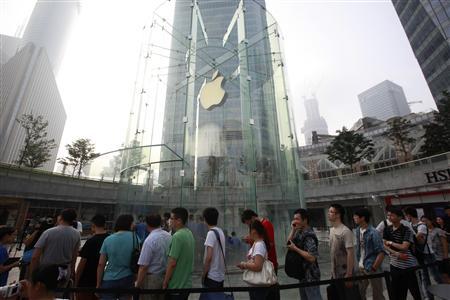Tim Cook’s apology to Apple’s Chinese customers has divided observers, some of whom claim that the public mea culpa might undermine the Cupertino company by giving credence to government criticism. Cook’s letter was posted (link via Google Translate) on the Chinese Apple Web site on Monday after two weeks of heated attacks by China’s state-run media.
Cook focused on Apple’s communication over its warranty and said the company would change its repair policy for iPhone 4 and iPhone 4S devices sold in China. “We realize a lack of communication in this process has led to speculation that Apple is arrogant and doesn’t care about or value consumers’ feedback,” wrote Cook. “We sincerely apologize for any concern or misunderstanding this has brought to customers.
The wording of Cook’s apology made it seem like a direct response to an article published by People’s Daily, the Chinese government’s official newspaper, that called the company “arrogant,” as well as a China Central Television’s investigative program that claimed Apple’s warranty practices discriminates against Chinese iPhone owners. (Other recent attacks by state-run media agencies included a report by official government press agency Xinhua, which blamed Apple for an increase in high-interest loans taken out by students to buy “fancy electronic products.”)
At stake is Apple’s second-biggest and fastest-growing market: “Greater China” (the term used to describe the market including China, Hong Kong and Taiwan) accounted for 13 percent of Apple’s sales last year.
Cook’s apology earned the Cupertino company pats on the head by the state media and government officials. The Global Times, published by the People’s Daily, wrote, “the company’s apology letter has eased the situation, softening the tense relationship between Apple and the Chinese market.” Foreign Ministry spokesman Hong Lei also told the press during a daily news briefing that “we approve of what Apple said.”
Despite the onslaught of highly critical articles, many Chinese netizens seemed dubious about the charges against Apple. In fact, the company may have undermined its positive image among consumers by issuing an apology, Shaun Rein, managing director and founder of China Market Research Group, told Bloomberg.
“After the criticism started taking place, my firm went out and interviewed about 30 Chinese consumers. The vast majority of them said ‘why is the media attacking Apple? Apple is known for great service,'” Rein said. “The consumers are saying the media should be attacking, say the pigs in the river, which is really disgusting.”
“The problem with Apple apologizing is that it gives credibility to the state media attacks,” Rein added. “We’ve gone out and interviewed consumers and they say ‘wait a minute. We supported Apple, but now they’re apologizing. Maybe there is something to all the criticisms by the state media.”
Analysts in favor of the apology said it was necessary because the company still needs to curry favor with the Chinese government. Apple’s hardware competes with domestic rivals like Huawei and Lenovo, and Chinese companies are beginning to develop OSes like Smartisan and Ubuntu Kylin that are meant to chip into the dominance of Western software.
Furthermore, after years of negotiations, Apple has yet to ink a deal with China Mobile, the Chinese state-owned telecom that is the world’s largest mobile phone operator with about 720 million subscribers–another reason why the company wants to stay on the Chinese government’s good side.
“They’re out of the woods and into the weeds. Things will rarely be smooth for Apple in China–even if consumers love it there will always be factions in and out of government that are trying to take it down,” Michael Clendenin, managing director of technology consultancy RedTech Advisors, told Reuters. “Apple made it easy this time, but they have learned to be more proactive. The next time they stumble, it will be easier to recover.”
But other observers say that Cook’s apology may actually be a sign that the Cupertino company is worried about its grip on the Chinese marketplace. Zhou Jiangong, the editor-in-chief of Forbes China, told Marketwatch that “Cook’s apology is not only a failure in the company’s public relations, but more importantly, it reflects the weakening position of Apple’s brand and innovation capacity. Apple still provides good products, but does not create demand by innovation anymore, like what it did before.” As its advantage in hardware is eroded, Apple will have to focus on localizing its software, which requires the support of local authorities, Zhou added.
Meanwhile, Zachary Keck at The Diplomat writes that Android’s continuing dominance in China may have underpinned Apple’s decision to apologize. Keck cites a report by Beijing-based mobile app analytics platform Umeng that shows that at the end of 2012, there were 160 million active Android users in China, compared to 85 million iOS users. Another report by Android phone management software startup Wandoujia found that there were even more Android users in China–224 million–than estimated by Umeng–and that by the end of this year, the number will increase to 300 million Android. “To be clear, the extraordinary growth of the Android OS in China is coming at Apple’s expense,” Keck said.
